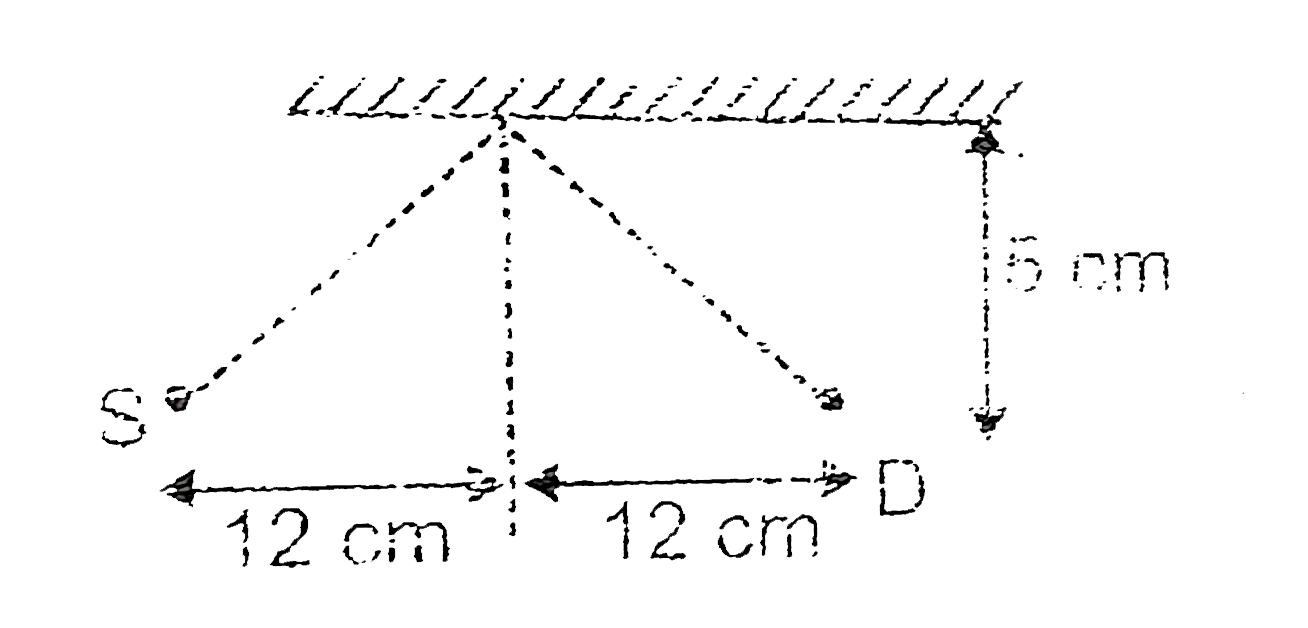When a sound wave is reflected from a wall the phase difference between the reflected and incident pressure wave is:
0
π
π/2
π/4
The correct Answer is:A
To solve the problem of determining the phase difference between the reflected and incident pressure wave when a sound wave is reflected from a wall, we can follow these steps:
1. Understanding the Reflection at a Fixed Boundary:
- When a sound wave hits a rigid wall (fixed boundary), it reflects back. At a fixed boundary, the particles of the medium cannot move, creating a node in terms of displacement.
Hint: Remember that a fixed boundary behaves like a node for displacement waves.
2. Analyzing the Incident and Reflected Waves:
- The incident wave approaches the wall, and upon reflection, it will have a phase change. For a wave reflecting off a fixed boundary, the reflected wave undergoes a phase shift of π (180 degrees) in terms of displacement.
Hint: Consider how the wave behaves at the boundary and the concept of phase shift upon reflection.
3. Phase Difference in Terms of Displacement:
- Since the reflected wave has a phase shift of π compared to the incident wave in terms of displacement, we can denote this as:
- Phase difference (displacement) = π radians.
Hint: Focus on the relationship between displacement and phase shift during reflection.
4. Understanding Pressure Waves:
- Pressure waves are related to the displacement waves but are not the same. At a fixed boundary, while the displacement is zero (node), the pressure is at its maximum (antinode).
Hint: Recall that at a node for displacement, the pressure variation is maximum.
5. Phase Difference in Terms of Pressure:
- Since the reflected wave at the boundary has the same pressure variation as the incident wave (both are at maximum), the phase difference in terms of pressure waves is:
- Phase difference (pressure) = 0 degrees.
Hint: Think about how pressure waves behave at nodes and antinodes.
6. Conclusion:
- Therefore, the phase difference between the reflected and incident pressure wave when a sound wave is reflected from a wall is 0 degrees.
Final Answer: The phase difference between the reflected and incident pressure wave is 0 degrees.
- When a sound wave hits a rigid wall (fixed boundary), it reflects back. At a fixed boundary, the particles of the medium cannot move, creating a node in terms of displacement.
- The incident wave approaches the wall, and upon reflection, it will have a phase change. For a wave reflecting off a fixed boundary, the reflected wave undergoes a phase shift of π (180 degrees) in terms of displacement.
- Since the reflected wave has a phase shift of π compared to the incident wave in terms of displacement, we can denote this as:
- Phase difference (displacement) = π radians.
- Pressure waves are related to the displacement waves but are not the same. At a fixed boundary, while the displacement is zero (node), the pressure is at its maximum (antinode).
- Since the reflected wave at the boundary has the same pressure variation as the incident wave (both are at maximum), the phase difference in terms of pressure waves is:
- Phase difference (pressure) = 0 degrees.
- Therefore, the phase difference between the reflected and incident pressure wave when a sound wave is reflected from a wall is 0 degrees.
Topper's Solved these Questions
- SUPERPOSITION AND STANDING WAVESBOOK - CENGAGE PHYSICS ENGLISHCHAPTER - SUPERPOSITION AND STANDING WAVESEXERCISE - Multiple
26 Videos
- SUPERPOSITION AND STANDING WAVESBOOK - CENGAGE PHYSICS ENGLISHCHAPTER - SUPERPOSITION AND STANDING WAVESEXERCISE - Assertion - Reasoning
6 Videos
- SUPERPOSITION AND STANDING WAVESBOOK - CENGAGE PHYSICS ENGLISHCHAPTER - SUPERPOSITION AND STANDING WAVESEXERCISE - Subjective
24 Videos
- SOUND WAVES AND DOPPLER EFFECTBOOK - CENGAGE PHYSICS ENGLISHCHAPTER - SOUND WAVES AND DOPPLER EFFECTEXERCISE - Integer
16 Videos
- THERMODYNAMICSBOOK - CENGAGE PHYSICS ENGLISHCHAPTER - THERMODYNAMICSEXERCISE - 24
1 Videos
Similar Questions
What is the phase difference between the displacement wave and pressure wave in sound wave :-
View SolutionWhat is the phase difference between the displacement wave and pressure wave in sound wave :-
View SolutionWhen a sky wave is reflected on to the ground
View SolutionA sound source, detector and a cardboard are arranged as shown in figure. The wave is reflected from the cardboard at the line symmetry of source edetector. Initially the path difference between the reflected wave and the direct wave is one third of the wavelength of sound. Find the minimum distance by which the cardboard should be moved upwards so that both waves are in phase.

View SolutionWhen a sound is reflected from a distant object, an echo is produced. Let the distance between the reflecting surface and the source of sound production remain the same. Do you hear echo sound on a hotter day ?
View SolutionWrite the difference between the propagation of sound and light waves.
View SolutionA progressive wave gets reflected at a boundary such that the ratio of amplitudes of the reflected and incident wave is 1:2. Find the percentage of energy transmitted .
View SolutionState two differences between light and sound waves.
View SolutionA wave is reflected from a rigid support. The change in phase on reflection will be
View SolutionAngle of reflection is the angle between the reflected ray and the ………………. incident ray/normal).
View Solution
